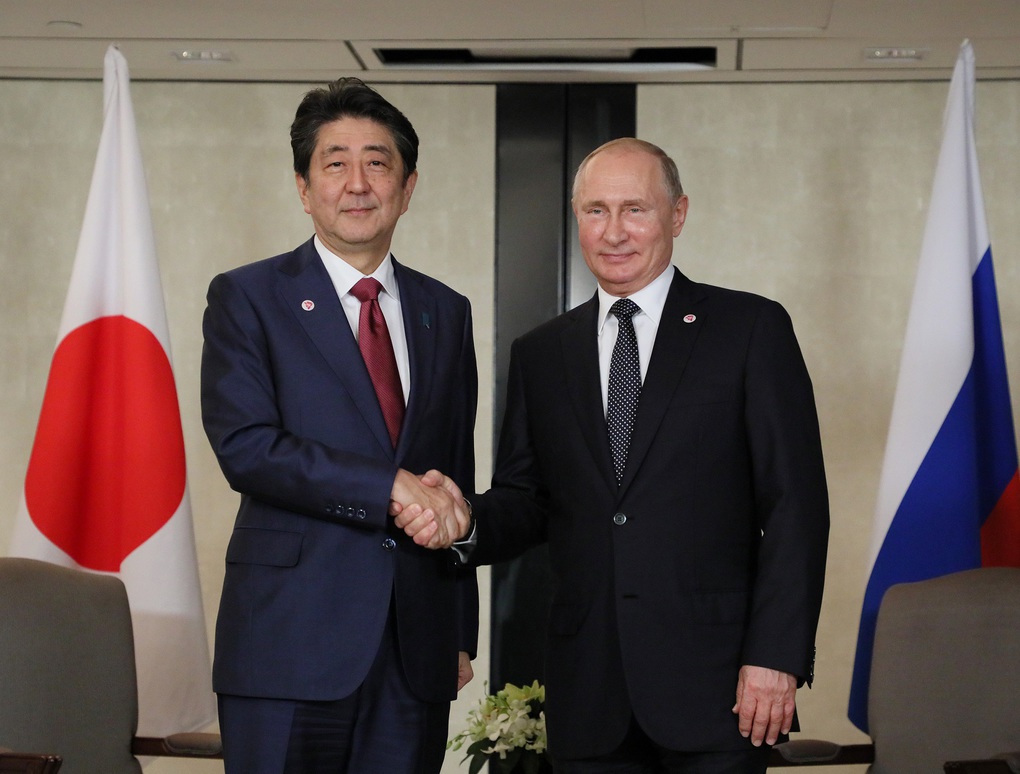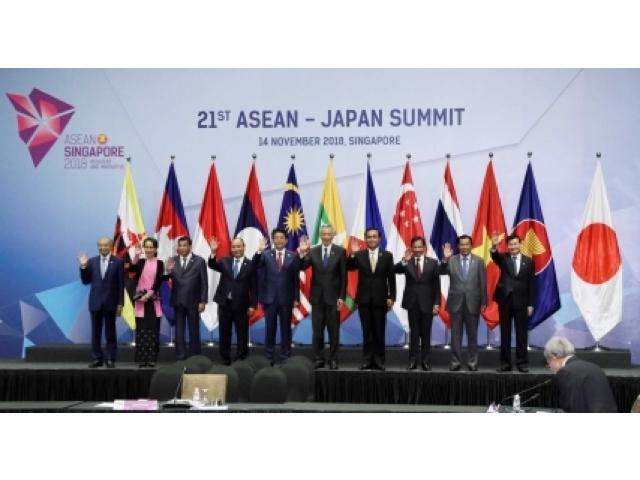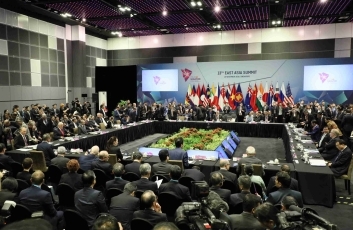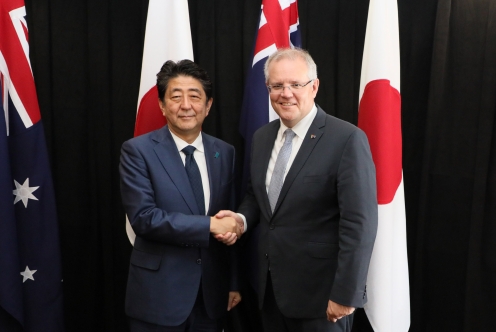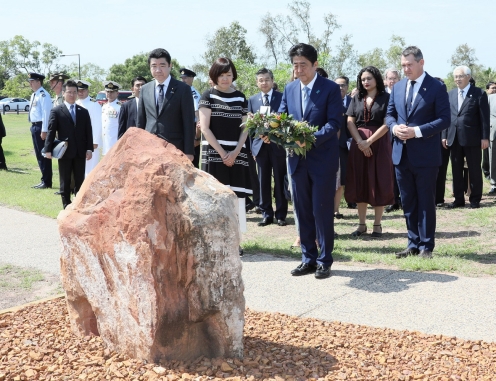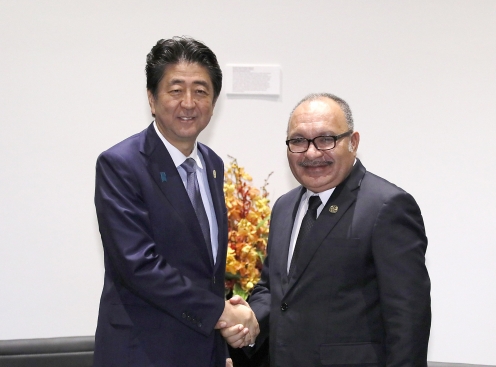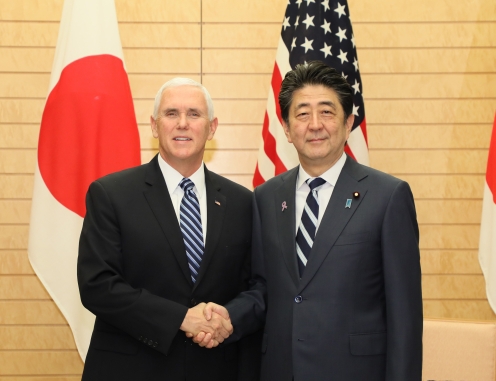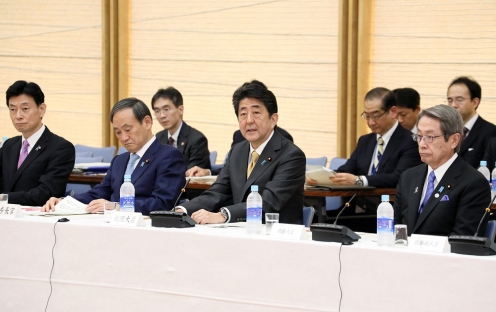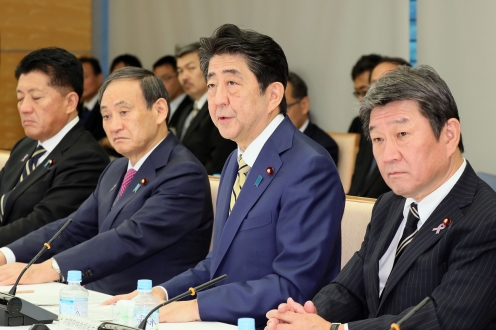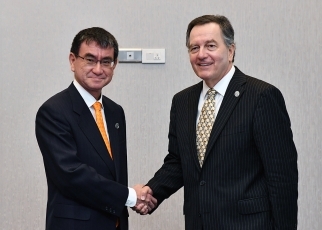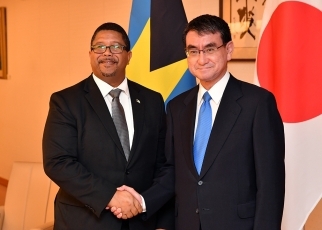ASEAN-related Summit Meetings and Other Events: Second Day
Cabinet Secretariat, Thursday, November 15, 2018
[Provisional Translation]
On November 15, 2018 (local time), Prime Minister Shinzo Abe, who is visiting the Republic of Singapore for the Association of Southeast Asian Nations (ASEAN)-related Summit Meetings and other events, held a meeting with H.E. Mr. Lee Hsien Loong, Prime Minister of the Republic of Singapore.
Afterwards, Prime Minister Abe participated in the 21st ASEAN Plus Three Summit Meeting, and the thirteenth East Asia Summit (EAS).
Following that, Prime Minister Abe held meetings with H.E. Mr. Joko Widodo, President of the Republic of Indonesia, Rt. Hon. Jacinda Ardern, Prime Minister of New Zealand, and H.E. Mr. Rodrigo Roa Duterte, President of the Republic of the Philippines, respectively.
ASEAN-related Summit Meetings and Other Events: First Day
Cabinet Secretariat, Wednesday, November 14, 2018
[Provisional Translation]
On November 14, 2018 (local time), Prime Minister Shinzo Abe visited the Republic of Singapore to attend the Association of Southeast Asian Nations (ASEAN)-related Summit Meetings and other events.
The Prime Minister attended the 21st Japan-ASEAN Summit Meeting, followed by the Regional Comprehensive Economic Partnership (RCEP) Summit.
Afterwards, the Prime Minister held a summit meeting with H.E. Mr. Vladimir Vladimirovich Putin, President of the Russian Federation.
21st Japan-ASEAN Summit Meeting
Foreign Affairs, Wednesday, November 14, 2018
On Wednesday, November 14, from 3:55 p.m. (local time), for about 1 hour, the Japan-ASEAN Summit Meeting was held in the Republic of Singapore chaired by H.E. Mr. Lee Hsien Loong, Prime Minister of Singapore. Mr. Shinzo Abe, Prime Minister, attended from Japan. The overview of the meeting is as follows.
Chairman's Statement of the 21st ASEAN-Japan Summit
1. Opening remarks
2. Closed session
1. Opening remarks
Following the statement by Prime Minister Lee, Prime Minister Abe stated the following.
(1) 45th anniversary of ASEAN-Japan Friendship and Cooperation
This year marks the 45th anniversary of ASEAN-Japan Friendship and Cooperation and we welcome the issuance of the Joint Statement of the 21st ASEAN-Japan Summit to Commemorate the 45th Anniversary of ASEAN-Japan Friendship and Cooperation. Following the ASEAN-Japan Music Festival held in Tokyo last month, the ASEAN-Japan Day will be held in Viet Nam next year. We will work to ensure that this is an opportunity to further deepen mutual understanding between Japan and ASEAN Member States.
(2) Assistance to ASEAN
Japan’s assistance to ASEAN has exceeded its commitment to provide 2 trillion yen over five years. We will support private investment and advance the development of quality infrastructure in accordance with international standards while respecting ASEAN’s unity and centrality. Specifically, Japan will utilize a new financing facility of the Japan Bank for International Cooperation (JBIC) and support for a variety of infrastructure projects that contribute to global environmental preservation.
(3) Industrial Human Resource Development Cooperation Initiative 2.0
Looking to the next five years, Japan will newly support industrial human resource development of approx. 80,000 people, including the digital sector such as artificial intelligence (AI), as “the Industrial Human Resource Development Cooperation Initiative 2.0.”
(4) ASEAN-Japan Fourth Industrial Revolution Initiative
Under the ASEAN-Japan Fourth Industrial Revolution Initiative, Japan will implement measures which include introducing digital-related rules and providing human resource development assistance.
(5) Promotion of free trade
As a standard-bearer of free trade, Japan will promote free and fair rules throughout the world through World Trade Organization (WTO) reform and other measures. From this perspective, the TPP-11 Agreement entering into force by the end of the year is an important achievement. Japan will aim to expand TPP-11, achieve swift conclusion of the Regional Comprehensive Economic Partnership (RCEP) negotiations, and realize the early signing of the Protocol to Amend the ASEAN-Japan Comprehensive Economic Partnership (AJCEP) Agreement.
(6) Smart Cities Network
Japan and Singapore will co-host the ASEAN Smart Cities Network (ASCN) Tokyo High-level Meeting next year. Japan will cooperate with ASEAN to realize ASCN by partnering with Society 5.0, the ASEAN-Japan Innovation Network, and the Japan-ASEAN STI for SDGs Bridging Initiative among others.
(7) Disaster management cooperation
Japan will utilize the Japan-ASEAN Integration Fund (JAIF) and collaborate with ASEAN in the area of disaster management, including cooperation through the ASEAN Coordinating Centre for Humanitarian Assistance on Disaster Management (AHA Centre).
(8) Environment cooperation
Japan will expand cooperation with ASEAN in combating marine plastic debris, in addition to addressing climate change based on the Japan-ASEAN Environment Cooperation Initiative.<./p>
(9) Asia Health and Wellbeing Initiative
Japan will work to bring about a balanced healthcare system under the Asia Health and Wellbeing Initiative.
(10) Education and culture
Japan will continue to deepen exchanges in the areas of education, science and technology, culture, and sports through the “WA Project” and other initiatives, building momentum towards the Olympic and Paralympic Games Tokyo 2020.
(11) ASEAN-Japan Centre
Japan will continue to advance necessary reforms of the ASEAN-Japan Centre.
2. Closed session
Prime Minister Abe stated the following on defense cooperation and regional and international affairs.
(1) Defense cooperation
Japan will promote practical defense cooperation under the Vientiane Vision.
Following the establishment of the ASEAN-Japan Cybersecurity Capacity Building Centre (AJCCBC) in Bangkok in September this year, Japan will continue to collaborate with ASEAN in the area of cybersecurity.
(2) Regional and international affairs
i. Free and open Indo-Pacific
Japan will continue to work closely with ASEAN member states to maintain and strengthen a free and open Indo-Pacific.
ii. North Korea
It is necessary to fully implement United Nations Security Council (UNSC) resolutions in order to achieve complete, verifiable and irreversible dismantlement (CVID) of all weapons of mass destruction and ballistic missiles of all ranges by North Korea as stipulated in UNSC resolutions.
Japan will wish to cooperate for responding to ship-to-ship transfers prohibited by the UNSC resolutions. Japan hopes to have ASEAN’s understanding and cooperation towards the early resolution of the abductions issue.
iii. South China Sea
Japan and ASEAN have enjoyed peace and prosperity through trade in the South China Sea. The South China Sea is a lifeline for both sides and freedom of navigation in the South China Sea is vital.
Japan fully supports the fundamental principles that ASEAN has upheld to ensure freedom of navigation and expresses its appreciation for ASEAN’s efforts, including those on the Code of Conduct (COC) negotiations. Japan hopes that these principles will be reflected in the COC.
Japan shares deep concerns over unilateral attempts to change the status quo in the South China Sea with ASEAN.
Japan will support ASEAN’s initiatives that seek to uphold non-militarization of the area and maintain a peaceful and open South China Sea.
In response, ASEAN made congratulatory remarks regarding the 45th anniversary of ASEAN-Japan Friendship and Cooperation. In addition, many countries commended Japan’s cooperation in various areas including disaster management and strengthening connectivity, and expressed appreciation for Japan’s efforts to realize a free and open Indo-Pacific. Issues on North Korea and the South China Sea were also raised.
Finally, as the Chair of ASEAN and with the approval of all participating countries, Singapore declared the issuance of the Joint Statement of the 21st ASEAN-Japan Summit to Commemorate the 45th Anniversary of ASEAN-Japan Friendship and Cooperation and concluded the meeting.
21st ASEAN Plus Three (Japan-China-Republic of Korea) Summit Meeting
Foreign Affairs, Thursday, November 15, 2018
On Thursday, November 15, from 11:40 a.m. to 12:45 p.m. (local time), the ASEAN Plus Three (APT) Summit was held in the Republic of Singapore. Mr. Shinzo Abe, Prime Minister, attended from Japan. The overview of the meeting is as follows.
1. Opening remarks
Following statements from Singapore as the Chair of ASEAN, China, and the Republic of Korea (ROK), Prime Minister Abe stated the following.
(1) General remarks
i. During my official visit to China, Japan and China agreed to play a constructive role for peace and prosperity of the international community. I am pleased that ASEAN and the leaders of Japan, China, and the ROK can meet together and discuss regional issues.
ii. Beginning with financial cooperation, APT has expanded its areas of cooperation to now include food security, poverty eradication, culture, tourism, and youth exchanges. Going forward, Japan will make a particular effort in the areas of the environment, disaster management, and healthcare.
(2) Environment
i. Japan will strengthen regional cooperation on the issue of marine plastic debris, which is now a serious issue. We welcome that the ASEAN Plus Three Marine Plastic Debris Cooperation Action Initiative (English(PDF)別ウィンドウで開く / Japanese(PDF)別ウィンドウで開く)proposed by Japan received the endorsement of member countries.
ii. Japan, in collaboration with China and the ROK, will assist ASEAN countries in developing institutions and infrastructure for “3R” (Reduce, Reuse, Recycle) and waste management, and promote the sharing of scientific knowledge.
(3) Disaster management
i. Based on lessons learned from frequent natural disasters, Japan will promote the Southeast Asia Disaster Risk Insurance Facility (SEADRIF). With the cooperation of Singapore and the World Bank, we will aim to make a catastrophe risk pool operational by mid-2019, with Lao PDR and Myanmar as beneficiaries, and have other ASEAN countries join SEADRIF in the future.
ii. Japan and the Philippines have signed a memorandum that will enable the supply of 10,000 tons of rice when a natural disaster occurs under the ASEAN Plus Three Emergency Rice Reserve (APTERR) Agreement. Japan welcomes that the APTERR Agreement will be amended in order to sustain stable APTERR operations.
(4) Active aging
Aging is an unavoidable issue for the region. Under the Asia Health and Wellbeing Initiative, Japan will aim to bring about a balanced and comprehensive healthcare system in Asia.
(5)
ASEAN, as the driving force in East Asia, sharing a common view with the three countries, Japan, China, and ROK will create strong momentum for resolving issues, including those on a global scale.
2. Review and future direction of ASEAN Plus Three cooperation
Prime Minister Abe explained the following seven points, primarily related to Japan’s efforts for APT cooperation.
(1) General remarks
In order to further strengthen APT partnership, Japan will seek to enhance cooperation in accordance with the Cooperation Work Plan.
(2) People-to-people connectivity
i. Higher education serves as the engine for boosting the vitality of countries. It is our duty to guarantee quality education for young people in East Asia and increase their mobility. Japan will work to develop talented students across the region.
ii. Japan will also promote cooperation between the East Asian Cultural Cities and the ASEAN Cities of Culture.
(3) Quality Infrastructure
Substandard infrastructure investments that do not meet international standards could compromise sustainable prosperity of the region. Japan will promote the development of quality infrastructure that ensures openness, transparency, economic efficiency in view of life-cycle cost, and fiscal soundness including debt sustainability of the recipient countries.
(4) Energy
In order to enhance energy security, Japan will continue to provide human resource development and financial support to promote LNG utilization in Asia, and strengthen initiatives in areas such as energy efficiency and conservation.
(5) RCEP and WTO reform
In light of rising concerns over protectionism in the world, the TPP-11 Agreement will enter into force by the end of the year. Japan will contribute proactively towards the early conclusion of the Regional Comprehensive Economic Partnership (RCEP) negotiations. In addition, Japan will cooperate on World Trade Organization (WTO) reform.
(6) Elimination of import restrictions
More than seven years have passed since the Great East Japan Earthquake. We request countries and regions that still maintain import restrictions ease and eliminate these restrictions, based on scientific evidence, as quickly as possible.
In response, other leaders made statements welcoming the progress of APT cooperation and shared the view of further deepening cooperation.
3. Exchange of views on regional and international affairs
During the discussion of the situation of the Korean Peninsula, Prime Minister Abe stated the following regarding North Korea.
(1) Full implementation of Security Council resolutions is needed for the denuclearization of the Korean Peninsula. Japan will cooperate on measures to counter ship-to-ship transfers that are prohibited by Security Council resolutions.
(2) North Korea is now at a crossroads at which it will either seize, or fail to seize, the historic opportunity it is afforded. North Korea has both untapped natural resources and a labor force whose productivity can be greatly enhanced. The resolution of issues will bring North Korea the dawn of a new day. Japan will seek to resolve the abductions, nuclear, and missile issues of North Korea, settle the unfortunate past, and normalize its relations with North Korea. Based on this policy, I am determined to break the cycle of mutual distrust with North Korea and meet face to face with Chairman Kim Jong-un to resolve the abductions issue as early as possible. I hope to have your understanding and cooperation on the resolution of the abductions issue as early as possible.
The 13th East Asia Summit
Foreign Affairs, Thursday, November 15, 2018
On Thursday, November 15, from 1:10 p.m. to 4:30 p.m. (local time), the East Asia Summit (EAS) retreat luncheon and plenary session was held in Singapore. Mr. Shinzo Abe, Prime Minister, attended from Japan. The overview of the meeting is as follows.
1. EAS retreat luncheon
2. EAS Plenary
1. EAS retreat luncheon
In a closed session, a discussion was held between the leaders regarding the future direction of EAS cooperation.
2. EAS Plenary
(1) Review of EAS cooperation
A. Prime Minister Abe stated that, during his official visit to China in October this year, Japan and China shared the view to play a constructive role for the peace and prosperity of the international community. He expressed his desire for the EAS discussions to proceed in the same spirit and stated the following.
(a) Free and open Indo-Pacific
(i) A free and open maritime order based on the rule of law is the cornerstone of the peace and prosperity in the Indo-Pacific region. We would like to realize a free and open Indo-Pacific for the development of this region. Included in this are the basic principles of ASEAN’s centrality and openness shared by EAS participating countries. Going forward, each country should work proactively to realize this.
(ii) Japan has taken concrete steps towards cooperation. In addition to implementing the joint hydrological surveys in the Straits of Singapore and Malacca, we have worked to build capacity and strengthen enforcement of maritime law. We are also advancing high quality infrastructure projects centered on the East-West Economic Corridor (EWEC) and the Southern Economic Corridor (SEC) that connect the Mekong region. We would like to emphasize the necessity of international standards of openness, transparency, economic efficiency, and fiscal soundness of recipient countries.
(iii) Initiatives that contribute to realizing a free and open Indo-Pacific do not exclude any countries. They benefit all countries in the region, large and small, and we will cooperate with all those who share these views.
(b)Sustainable economic development of East Asia
(i) The spectacular economic growth of East Asia has resulted from trade and investment based on free and fair rules. Amidst growing protectionism, TPP-11 entering into force by the end of the year is an important achievement. We must promote free trade through World Trade Organization (WTO) reform, the expansion of TPP, and the swift conclusion of the Regional Comprehensive Economic Partnership (RCEP).
(ii) We will promote the utilisation of LNG, hydrogen, and so on. (iii) We look forward to the active role of the Economic Research Institute for ASEAN and East Asia (ERIA), which marked its 10th anniversary, to address issues such as ASEAN’s integration and reducing inequality.
B. In response, many participating countries expressed their respective views and concepts regarding the Indo-Pacific, confirmed common perspectives, and affirmed the importance of continuing discussions in order to further collaborate with and complement one another.
(2) Exchange of views on regional and international issues
A. North Korea
(a) Prime Minister Abe stated the following
(i) Japan welcomes the historic U.S.-North Korea Summit Meeting and three Inter-Korean Summits as a step toward the comprehensive resolution of the outstanding issues of concern such as abductions, nuclear, and missile issues. It is important for the international community to continue to support the U.S.-North Korea process.
(ii) It is necessary to fully implement the United Nations Security Council (UNSC) resolutions in order to achieve complete, verifiable, and irreversible dismantlement (CVID) of all weapons of mass destruction and ballistic missiles of all ranges by North Korea as stipulated in the UNSC resolutions.
(iii) Japan highly appreciates the cooperation of countries including the United States, Australia, the United Kingdom, Canada, and New Zealand for dispatching aircrafts and vessels to counter ship-to-ship transfers prohibited by UNSC resolutions. Japan wishes to continue to cooperate with each country.
(iv) Japan hopes to have understanding and cooperation towards the early resolution of the abductions issue.
(b) In response, many countries emphasized the importance of the denuclearization of the Korean Peninsula and of the full implementation of the UNSC resolutions.
B. Maritime security
(a) Prime Minister Abe stated the following
(i). Disputes in the South China Sea should be resolved peacefully based on international law and not by force. From this perspective, we fully expect the formulation of an effective South China Sea Code of Conduct (COC) that can contribute to realizing a peaceful, open South China Sea.
(ii). At the same time, we have serious concerns about the developments in the South China Sea. Actions that seek to unilaterally change the status quo through militarization of disputed features threaten the interests of countries that utilize common resources in the South China Sea that support peace and stability of the entire region.
(iii). In order to realize a peaceful and open South China Sea, Japan supports the fundamental principles of “full respect for legal and diplomatic processes," “freedom of navigation,” and “the importance of non-militarization and self-restraint” that ASEAN has stipulated. Its importance should be conveyed strongly to the international community.
(b) In response, many countries referenced freedoms of navigation and overflight as well as the importance of the peaceful resolution of disputes in accordance with international law, including the UN Convention on the Law of the Sea. In addition, numerous countries raised the importance of non-militarization and self-restraint. Among such countries, some expressed serious concerns over the situation on the ground. Furthermore, many countries stated the necessity of an effective COC.
C. The situation in the Rakhine State
(a) Prime Minister Abe stated the following.
i. We commend the dialogue between Myanmar and Bangladesh on the return of displaced persons. It is our sincere hope that, in cooperation with the United Nations, their "safe, voluntary and dignified" return will be realized. The international community should continue to support the efforts of Myanmar and Bangladesh.
(b) In response, several leaders expressed concern about the human rights situation in Rakhine State and emphasized the need for safe return of the displaced persons.
Japan-Australia-India-U.S. Consultations
Foreign Affairs, Thursday, November 15, 2018
On November 15, senior officials from Japan, Australia, India and the United States, met in Singapore for Consultations on the Indo-Pacific region.
The four countries reaffirmed a shared commitment to maintain and strengthen a rules-based order in the Indo-Pacific in which all nations are sovereign, strong, and prosperous. They further highlighted the complementary visions for the region held by the four countries, grounded in a shared support for a free, open, and inclusive region that fosters universal respect for international law, freedom of navigation and overflight, and sustainable development.
The four countries focused on their shared goals, including support for sustainable development, connectivity, and good governance. They highlighted the importance of good governance in strengthening the rules-based order and reviewed initiatives to enhance regional security, including through cooperation on maritime, counterterrorism, non-proliferation, and cyber issues. They committed to supporting broad economic development that harnesses the region’s full potential and fosters development of quality infrastructure based on international standards, such as openness, transparency, economic efficiency, and debt sustainability.
The four countries reaffirmed their strong support for ASEAN centrality and the ASEAN-led regional architecture, as well as their support for other regional institutions such as the Indian Ocean Rim Association and the Pacific Islands Forum. They highlighted the importance of coordination and collaboration with all interested countries and institutions to support a diverse, peaceful, and prosperous region.
The four countries also exchanged views on regional developments including in Sri Lanka and Maldives.
The four countries looked forward to regular Consultations on Indo-Pacific engagement and initiatives.
Visit to Australia: First Day
Cabinet Secretariat, Friday, November 16, 2018
[Provisional Translation]
On November 16, 2018 (local time), Prime Minister Shinzo Abe visited the Commonwealth of Australia.
Prime Minister Abe visited the Darwin Cenotaph in Darwin, Australia, together with the Hon. Scott Morrison MP, Prime Minister of the Commonwealth of Australia. At the cenotaph, the leaders offered wreathes and observed a moment of silence. Afterwards, Prime Minister Abe held a meeting with Prime Minister Morrison, and then the leaders attended an exchange of documents ceremony for Memoranda of Understanding, and a joint press announcement. Following that, the leaders attended a reception hosted by the Hon. Michael Gunner MLA, Chief Minister of the Northern Territory.
Later, Prime Minister Abe held a press conference on the ASEAN-related Summit Meetings and his visit to Australia.
Lastly, the Prime Minister attended a ceremony for the Ichthys LNG Project, where he delivered an address.
Visit to Australia: Second Day
Cabinet Secretariat, Saturday, November 17, 2018
[Provisional Translation]
On November 17, 2018 (local time), Prime Minister Shinzo Abe, who is visiting the Commonwealth of Australia, inspected the patrol vessel Echigo, and delivered an address to its crew. Following that, the Prime Minister visited the memorial dedicated to Submarine I-124, where he offered a wreath and observed a moment of silence.
APEC Economic Leaders’ Meeting and Other Events: First Day
Cabinet Secretariat, Saturday, November 17, 2018
[Provisional Translation]
On November 17, 2018 (local time), Prime Minister Shinzo Abe visited the Independent State of Papua New Guinea to attend the Asia-Pacific Economic Cooperation (APEC) Economic Leaders’ Meeting.
Prime Minister Abe attended the APEC Business Advisory Council (ABAC) Dialogue with APEC Economic Leaders, and then the APEC Leaders’ Dialogue with Pacific Island Leaders.
Afterwards, Prime Minister Abe held a meeting with the Hon. Peter O'Neill, Prime Minister of the Independent State of Papua New Guinea.
In the evening, the Prime Minister attended a gala dinner.
Courtesy Call from the Vice President of the United States and Other Events
Cabinet Secretariat, Tuesday, November 13, 2018
[Provisional Translation]
On November 13, 2018, Prime Minister Shinzo Abe received a courtesy call from the Honorable. Mike Pence, Vice President of the United States of America, at the Prime Minister’s Office. Afterwards, the Prime Minister held a joint press announcement with Vice President Pence.
The National Governors’ Conference
Cabinet Secretariat, Friday, November 9, 2018
[Provisional Translation]
On November 9, 2018, Prime Minister Shinzo Abe attended the National Governors’ Conference held at the Prime Minister’s Office.
The Prime Minister said in his address,
“Thank you very much for coming from all over the country today despite your busy schedules. I am very pleased to have this opportunity to hear views directly from governors who are making efforts day and night to further develop and advance your prefectures.
Japan will not have vitality unless its regions do as well. With that in mind, the Abe Cabinet has hoisted the banner of regional revitalization high and mobilized various policy measures. Consequently, the ratio of active job openings to applicants exceeds 1.0 for all prefectures for the first time in history, and the regional tax revenue reached a record high.
To further add more momentum to this strong wave of regional revitalization, we will continue to listen carefully to the voices of the local communities and exert our full efforts into creating vitality in the regions over the next three years. To fully draw out the charms that are unique to each region, such as the rich natural environment, characteristic hometown specialties, inimitable technological prowess of local companies, as well as local history, culture, and traditions, we will provide utmost support for the enthusiasm and unique creativity of the regions through means such as the Regional Revitalization Promotion Grant of 100 billion yen. In order to create flows of people to each region, we have until now been devoting efforts into initiatives such as expanding the Regional Vitalization Cooperation Volunteers. Going forward, we aim to provide strong support for U-turns (from their hometown in a local district to a city and back), I-turns (from their hometown in a local district to a different local district) and J-turns (from their hometown in a local district to a nearby city) among young people who feel that there are more opportunities in the regions.
The greatest challenge facing Japan is the declining birthrate and ageing society. We will tackle this issue head-on, and invest boldly in the children who will represent the future and the childrearing generation. We will make greater use of the experiences and wisdom of our energetic and motivated elderly people. Over the next three years, we will proceed with reforms to realize a social security system that can provide peace of mind to all generations from children and the current working generation to the elderly, transforming adversity into opportunity. We will approach the challenges with this resolve.
This summer, a series of natural disasters caused severe damage in many areas in Japan including the earthquake in the northern part of Osaka, the heavy rains in western Japan in July, Typhoon No. 21*, and the Hokkaido Eastern Iburi Earthquake. Through the new scheme established this spring, the municipalities across Japan, including the respective prefectural governments, has provided strong support for the areas affected by the disaster such as the dispatch of more than 17,000 staff in total immediately after the disasters struck. I would like to express my respect for the activities of mutual assistance that go beyond the boundaries of the respective municipalities, and at the same time, ask for your continued support for the municipalities affected by the disasters moving forward.
A supplementary budget of 935.6 billion yen was passed in the Diet the day before yesterday. With this supplementary budget, we will accelerate our disaster recovery efforts, and put in place high priorities such as safety measures for concrete walls to protect the lives of our children and the installation of air-conditioning units in public elementary and junior high schools as a measure against heatstroke. Furthermore, in order to promote building safe communities, we will move forward on infrastructure development in response to the rapidly changing weather conditions in recent years and implement emergency measures for disaster prevention and disaster mitigation as well as building national resilience intensively over the next three years.
The Government will work as one to implement various policy measures with engaging in close discussion with all of you going forward, including this Conference today. I ask for your understanding and cooperation on the policies that the Government promotes. Thank you very much once again, and I am looking forward to hearing your views today.”
*Typhoon Jebi
Meeting of the Council on Economic and Fiscal Policy
Cabinet Secretariat, Monday, November 12, 2018
[Provisional Translation]
On November 12, 2018, Prime Minister Shinzo Abe held the 13th meeting of the Council on Economic and Fiscal Policy in 2018 at the Prime Minister’s Office.
At the meeting, an intensive discussion was first held on monetary policy, commodity prices, and other issues, followed by discussions on education and science and technology, as well as social infrastructure improvement and building national resilience, which are some of the thematic topics of the Integrated Economic and Fiscal Reforms.
Based on the discussion, the Prime Minister said,
“Today, we first held intensive discussions on monetary policy, commodity prices, and other issues. It was indicated that, while the fundamentals of the Japanese economy are sound as seen from the steady improvements in employment and the income situation, there are several points we need to carefully monitor such as the trends of the global economy. I ask Minister Motegi to take all possible measures with regard to economic management.
The Abe Cabinet remains steadfast in placing the economy as our utmost priority. We will make thorough efforts so as to sustain this trend of economic recovery while closely watching the economic situation in Japan and overseas.
With regard to the development of social infrastructure, we shared the recognition that emergency measures aimed at disaster prevention and disaster mitigation as well as building national resilience, are pressing issues toward securing safety and security in the lives of the people and the foundation of the Japanese economy. I ask Minister Yamamoto who is in charge of Building National Resilience and the relevant ministers to ensure that the discussions today will be reflected in the three-year emergency measure package, which will be compiled by the end of this year, and in the Fundamental Plan for National Resilience, which is due for its five-year review.
While this can be applied to the field of science and technology policy, which is another agenda of this meeting, in these fields, how the public and private sectors divide their roles and cooperate and how we promote private sector investment are important keys in materializing the sustainable growth of the Japanese economy. I ask the relevant ministers to thoroughly address this by promoting institutional reforms and other means, while taking these perspectives into consideration.
The revitalization of education is an extremely important issue. I ask Minister Shibayama to engage proactively to fundamentally improve the quality of education from primary and secondary education to higher education, through a focused budget allocation based on highly reliable evidence and objective indicators, and the utilization of external funds.”
Japan-Chile Foreign Ministers' Meeting
Foreign Affairs, Thursday, November 15, 2018
On November 15, commencing at 8:38 a.m. (local time; 7:38 a.m. the same day, Japan time) for approximately 30 minutes, Mr. Taro Kono, Minister for Foreign Affairs, who is visiting Port Moresby, Papua New Guinea, to attend the APEC Ministerial Meeting, held a Foreign Ministers' Meeting with H.E. Mr. Roberto Ampuero, Minister of Foreign Affairs of the Republic of Chile. The overview of the meeting is as follows.
At the beginning, Minister Kono stated that a meaningful exchange of views was achieved at the Foreign Ministers' Meeting held when Minister Ampuero visited Japan in September this year, and that Minister Kono intended to actively contribute to the success of APEC next year which Chile will host. In response, Minister Ampuero remarked that he was very pleased to be able to meet again and his visit to Japan in September was an extremely meaningful visit which reaffirmed that Japan is an important partner, and then stated that Chile, as a country that promotes free trade, considers the APEC Summit it will host next year to be extremely important and the summit is a top priority of the current administration, and therefore he hoped to make the APEC Summit a success, obtaining the cooperation of Japan.
Furthermore, Minister Kono pointed out the importance of the TPP 11 Agreement while also stating that the TPP 11 Agreement is planned to enter into force on December 30, so he expressed his hope that Chile would also complete the domestic procedures and give notification as soon as possible. In response, Minister Ampuero explained that the TPP 11 Agreement had been submitted to the Chamber of Deputies while also stating that he hoped to continue to closely cooperate regarding the promotion of free trade.
Both ministers shared the view regarding relations between the two countries that initiatives were proceeding in a wide range of areas, not just the economy, and that they would strengthen relations further going forward. Moreover, they held exchanges of views regarding the importance of the establishment of the follow-up mechanisms for the Japan-Pacific Alliance Ministerial Meeting and regarding the regional affairs, including Venezuela, and shared the same view that they would cooperate closely in these areas.
Foreign Minister Kono Meets with the Deputy Prime Minister of The Bahamas
Foreign Affairs, Monday, November 12, 2018
On November 12, commencing at 5:35 p.m. for approximately 15 minutes, Mr. Taro Kono, Minister for Foreign Affairs of Japan, held a meeting with Hon. Kevin Peter Turnquest, Deputy Prime Minister and Minister of Finance of the Commonwealth of The Bahamas, who is visiting Japan. The overview of the meeting is as follows.
At the beginning, Minister Kono welcomed Deputy Prime Minister Turnquest’s first visit to Japan and conveyed his congratulations on the opening of The Bahamas Maritime Office in Tokyo. Minister Kono stated that Japan hoped to further strengthen bilateral and Japan-CARICOM relationships with The Bahamas, an important partner. In response, Deputy Prime Minister Turnquest stated that The Bahamas expressed appreciation to the long-standing cooperation with Japan, and that we would hope to strengthen ties with Japan to open the Maritime Office and start exchanging tax information automatically.
The two ministers exchanged views regarding cooperation in international arena on issues such as North Korea, and shared the view on deepening their cooperative relationship.
Ahead of the meeting, the two ministers exchanged notes verbales for the entry into force of the Protocol Amending the Japan-Bahamas Tax Information Exchange Agreement.
[Reference] CARICOM (The Caribbean Community)
(1)CARICOM was established in 1973 based on the Chagaramas Agreement (this year marks the 45th anniversary). The Secretariat is located in Guyana.
(2)CARICOM is a regional organization with the objectives of advancing regional economic integration, enhancing coordination of foreign policies, and encouraging cooperation in areas such as health and medical care and education.
(3)Member states are the following 14 countries and 1 region: Antigua and Barbuda, The Bahamas, Barbados, Belize, Dominica, Grenada, Guyana, Haiti, Jamaica, Saint Christopher and Nevis, Saint Lucia, Saint Vincent and the Grenadines, Suriname, Trinidad and Tobago, and Montserrat (British overseas territory)
Protocol Amending Tax Information Exchange Agreement with the Commonwealth of The Bahamas will Enter
Ministry of Finance, Monday, November 12, 2018
[Provisional translation]
Today, the exchange of diplomatic notes for the entry into force of the Protocol Amending the Agreement between the Government of Japan and the Government of the Commonwealth of The Bahamas for the Exchange of Information for the Purpose of the Prevention of Fiscal Evasion and the Allocation of Rights of Taxation with respect to Income of Individuals (signed on February 9, 2017) took place in Tokyo.
Therefore, this Protocol will enter into force on December 12, 2018 (the thirtieth day after the date of exchange of diplomatic notes). The new article concerning Automatic Exchange of Information shall be applicable:
(1) with respect to taxes levied on the basis of a taxable year, for taxes for any taxable years beginning on or after 1 January 2017; and
(2) with respect to taxes not levied on the basis of a taxable year, for taxes levied on or after 1 January 2017.
[Reference] Texts
“Protocol Amending the Agreement between the Government of Japan and the Government of the Commonwealth of The Bahamas for the Exchange of Information for the Purpose of the Prevention of Fiscal Evasion and the Allocation of Rights of Taxation with respect to Income of Individuals”
Emergency Grant Aid in response to the damage caused by drought in the Islamic Republic of Afghanistan
Foreign Affairs, Tuesday, November 13, 2018
1. On November 13, the Government of Japan decided to extend an Emergency Grant Aid of 13 million US dollars, in response to the damage caused by drought in the Islamic Republic of Afghanistan, through the World Food Programme (WFP).
2. This Emergency Grant Aid is to provide humanitarian assistance in the areas of Food and Nutrition in the Islamic Republic of Afghanistan.
3. This assistance is expected to contribute to addressing food insecurity and improve the nutritional status of 473,000 people by distributing food to them.




























